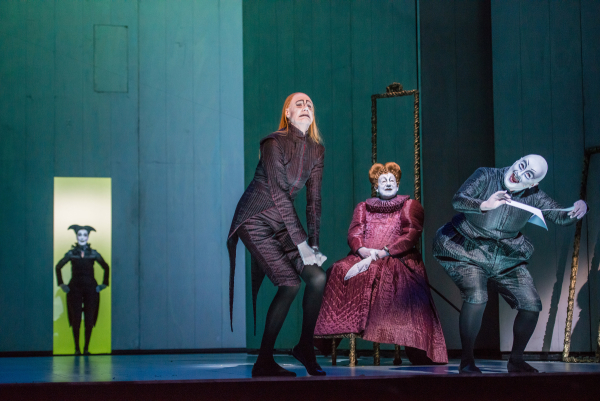Shakespeare's Sonnets

(© Stephanie Berger)
William Shakespeare never meant for any of his sonnets to take the stage. Still, are we really surprised that these poems of unrequited desire and mortality, authored by the greatest English playwright, are overflowing with dramatic potential? Director Robert Wilson and composer Rufus Wainwright, with the help of Bertolt Brecht's legendary Berliner Ensemble, have adapted 25 of the sonnets for the stage, with shockingly beautiful results. Shakespeare's Sonnets is now making its U.S. debut at BAM's Howard Gilman Opera House, after a 2009 premiere in Berlin.
One might assume that a collaboration of such huge artistic personalities is doomed to suffer from too-many-cooks-in-the-kitchen syndrome, resulting in an array of incoherencies. Happily to the contrary, each creative voice takes up the space it rightfully deserves, blending into a complete event in which no element feels out of place.
Rather than an opera with an overarching through-line, Shakespeare's Sonnets takes the form of an evening of live music videos enacted by a repertory ensemble. Most of the sonnets are performed in German (with English subtitles), making many of Wainwright's sublime melodies sound like romantic lieder. It's a surprisingly fruitful choice, considering that the words were originally written in English. As performed by the talented Berliner Ensemble, it feels like a night of cabaret, albeit on a much grander stage. Well-considered comic relief tempers torch songs, keeping us in a state of constant emotional flux.
Wainwright has composed an engrossing pastiche, hitting the audience with sounds that are reminiscent of Mozart, Siouxsie Sioux, Marvin Hamlisch, Jimi Hendrix, and (of course) Kurt Weill. He turns sonnet 29 into a lullaby of despair and hope, swelling with classical flourishes on the bridge. Sonnet 23 becomes a hard-charging pop-punk anthem. Sonnet 66 is a dark and twisted cabaret number à la Hanns Eisler, ascending a minor scale with accelerating force. Wainwright is the heir of many musical traditions; he pushes them all forward with his own uniquely melodic style.
Responding to Wainwright's eclectic score, Wilson creates a dizzying array of playing spaces, each tailored to the sonnet at hand. Sonnet 43 is set in an austere bedroom that appears as though there is a mirror running down the center. Sonnet 23 (the aforementioned pop-punk number) takes place in a white room with three giant gas pumps. Sonnet 148 is perhaps the most visually stunning: A giant bicycle crosses paths with a tiny one as a four-legged creature with glowing eyes snarls out at the house. The thing about directing music videos is that, while they don't always need to tell a story, they do need to look cool and make an impression. With his instantly recognizable style, Wilson does that again and again.
My only quibble is that Wilson's self-aware, often coldly intellectual staging has a disappointing tendency to sabotage some of the more heartbreaking passages of Wainwright's songs: Sonnet 20, a tragic ballad of unrequited (possibly queer) love, is constantly interrupted by an obnoxious and clownish repetition of the lyrics, pulling us out of the moment before melancholy can fully take hold. Of course, such alienating disturbances work well with the Berliner Ensemble, which is used to performing works by Brecht that eschew maudlin sentimentality in favor of emotional distance.
Even then, the troupe delivers some very memorable performances. Jürgen Holtz particularly stands out as Queen Elizabeth (I and II). I don't speak German, but his readings are so clear and expressive that no translation is needed. Like a skilled emcee, Georgette Dee comes out in front of the curtain during the (sometimes lengthy) scene transitions, keeping the audience in hysterics with her melodramatic rants about the show.
Everyone appears in drag in Jacques Reynaud's detailed, monochromatic costumes. Characters like cupid, the fool, and even Shakespeare himself are instantly recognizable in looks that are simultaneously iconic and unmistakably Robert Wilson. Andreas Fuchs and Ulrich Eh light the stage in a manner that is consistent with Wilson's style and also reminiscent of German cabaret.
There's so much to like about Shakespeare's Sonnets, but at three hours, it's a commitment. Still, if you're in the mood for a sensory overload set to a beautifully melodic new score, this is your best bet.











